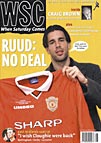 If Howard Wilkinson has his way, professional coaches in England will eventually have to obtain an official qualification. Bernd Huck explains how the system works in Germany
If Howard Wilkinson has his way, professional coaches in England will eventually have to obtain an official qualification. Bernd Huck explains how the system works in Germany
Karlheinz Riedle never wanted to be a coach. But when Mohamed Al-Fayed sacked Paul Bracewell and asked Riedle to take charge at Craven Cottage, he agreed to do the Fulham owner a favour. “But only for a short time, because I’m really not the coaching type.”
Nor does he have any qualifications for the job, which in his home country are a necessary precondition for anyone who wants to coach a team. In Germany every coach has to have a licence, and every team has to have a licensed coach. The DFB (German FA) has always been a law unto itself, but in this case their strict rules should not be written off simply as an example of obsessive German bureaucracy. In fact the system makes a lot of sense, especially for the lower leagues.
A B-licence, which allows you to coach up to the level of the fifth division, requires 120 hours of teaching. An A-licence involves a five-week course and entitles you to coach up to regional league level (Third Division). To coach a team in the top two divisions you have to be licensed as a Football Instructor, which takes six months.
Coaches like Rudi Gutendorf (currently in the 54th post of his career) and Dettmar Cramer have taken the German training system for coaches to all parts of the world, so that in the US and in parts of Africa German qualifications are now officially recognised.
The DFB has an arrangement with professional players that allows anyone who has played more than 70 internationals to take a shortened course. But even Franz Beckenbauer was only allowed to be called the “head” of the team that won the World Cup in 1990. Officially the coach was the almost unknown Holger Osiek (now in charge of Canada), who held the appropriate licence.
Riedle himself trotted out the familiar argument that a professional of his calibre and experience should not need a licence to prove they can coach. “The ball is round and you have to get it in the goal,” he said. “That’s all. Look at Franz Beckenbauer and Gianluca Vialli. If you have experience, good man-management and a tactical brain, why would you need a licence?”
Because being a football coach is a profession like any other, says Erich Rutemöller, an instructor with the DFB, who is due to take over as head of its coaches’ training course in the summer. “If you want to be a bricklayer, first you have to do an apprenticeship, then be a journeyman, then maybe in the end you become a master craftsman.
“In football, experience and personality obviously play a large role, but every coach should also know how to run a coaching session and be familiar with ideas about leadership, public speaking, sports medicine and sports psychology,” says Rutemöller.
Such is the current dismal state of the German national team that some commentators are beginning to question the uniform system of training. What if it has succeeded only in breeding identikit coaches, simply replicating rigid and outdated tactical systems?
“That’s rubbish,” says Rutemöller. “Everyone brings with them their own prejudices and their own personality, and they all go their separate ways. On any given coaching course you might find 25 different characters. In any case we expose them to all kinds of different systems and then everyone adopts whatever suits them best.”
As it turned out, Riedle’s time in charge proved brief. “I never had the desire to be the boss and I never will,” he said. In Germany, he never would have been.
Additional reporting by Ronald Reng
From WSC 160 June 2000. What was happening this month